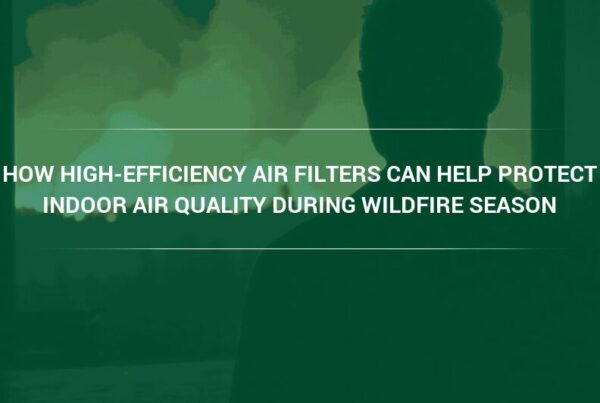Learn how vitamin B, along with air filters, could be the key to solving the air pollution affecting indoor air quality in buildings across the country.
While ambient air quality across much of the United States has steadily improved over the years, homes and buildings should still be outfitted with air filters to ensure indoor air is healthy.
Aside from air filters, there’s a growing body of literature on other methods that mitigate the effects of poor air quality. According to one study conducted at Columbia University’s Mailman School of Public Health, healthy non-smoking individuals who took vitamin B supplements almost reversed any harmful effects of exposure to polluted air on their immune and cardiovascular function.
Medication and Air Filters Just Two of Many Ways to Address Air Pollution
The results of the study prove that air pollution is a crisis that can be addressed on several fronts, one being the capture and removal of airborne pollutants with air filters.
In fact, the test subjects’ supplement regimen reduced the effects of air pollution on:
- Heart rate, by 150 percent
- White blood cell count, by 139 percent
- Lymphocyte count, by 106 percent
While it has yet to be determined if the results of this study can be replicated, it’s nevertheless worth considering, given the dangers of poor air quality on public health.
“Long-term exposure to ultrafine particles can induce respiratory and cardiovascular diseases,” explained Mark Davidson, Manager of Marketing & Technical Materials, at Camfil USA. “Below PM2.5, particles are more harmful because they penetrate deeper into the lung alveoli. They cross blood vessels walls, diffuse into the blood circulation to reach and affect organ function (heart, liver, brain, and endocrine system).”
The Dangers of Particulate Matter on Indoor Air Quality
Air pollution from particulate matter, or PM, is especially dangerous to indoor air quality, contributing to more than 3.7 million premature fatalities annually around the world, with the causes of death predominantly attributed to cardiovascular disease. At the population level, PM pollution is cited as the most frequent cause of myocardial infarction.
Particulate matter is composed of solid or liquid substances that are small and light enough to be airborne. The largest PM particles can be seen with the naked eye as dust-like particles under beams of sunlight. For the most part, the human body does a fairly good job of keeping these larger particles out of the body. It’s the smaller PM that you can’t even see, especially PM2.5, or particles 2.5 microns in diameter, that represents a serious problem to public health.
Particles of this size and below can penetrate the smallest alveoli of the lungs, where they can cross into the bloodstream and reach the body’s vital organs, increasing the risk of developing cardiovascular, respiratory, and immune system issues.
PM Exposure Requires Intervention by High Efficiency Air Filters
The results of the study concerning particulate matter raise the urgency of protecting homes and buildings with higher efficiency air filters.
The researchers tested 10 healthy non-smokers, ages 18 to 60, who were not put on any kind of vitamin B supplement program or any other kind of medication. The 10 volunteers, however, received a placebo over a four-week period before being exposed to ambient air with PM2.5 for two hours. During the next four-week period, the volunteers were given vitamin B supplements before being exposed to low air quality for two hours.
The researchers found that just two hours of exposure to concentrated levels of PM2.5 in the air had significant effects on the heart rate, white blood counts, and heart rate variability of the test subjects. The good news is that these effects were nearly reversed with a four-week vitamin B regimen.
Other Pollutants Captured by Particulate and Molecular Air Filters
While the results of the study are obviously important in the field of medical science, this doesn’t mean that vitamin B can be considered a wonder supplement against the effects of air pollution. And even if it were, it’s important to remember that air pollution contains pollutants other than particulate matter. This is why air filtration systems, designed to remove a wide variety of pollutants, are so important.
These contaminants include:
- Chemical pollutants – This includes volatile organic compounds (VOCs), which are produced by paints, solvents, finishes, construction materials, and even office equipment.
- Gaseous pollutants – This includes pollutants such as carbon monoxide, cigarette smoke, and car exhaust, all of which are in gas form.
- Biological contaminants – These pollutants are composed of airborne bacteria, viruses, and fungi, which are common in hospitals, workplaces, and even schools.
Beware of Cheap Air Filters
As interest in air filtration systems increases due to serious air pollution levels in parts of the country, some manufacturers have taken advantage of this demand by selling cheap air filters that promise “premium performance.” Most of these are too good to be true; focus on high-quality air filters from a trusted manufacturer instead.
For more than five decades, Camfil USA has been a leading name in the air purifier industry, protecting the indoor air quality in homes and buildings all over the world. To learn about the importance of protecting indoor air quality from outdoor air pollution, talk to Camfil USA. As one of the world’s top commercial air filter manufacturers, we have a wide range of air filter solutions for you to explore.
Media Contact:
Lynne Laake
Camfil USA Air Filters
T: 888.599.6620
E: Lynne.Laake@camfil.com
F: Friend Camfil USA on Facebook
T: Follow Camfil USA on Twitter



